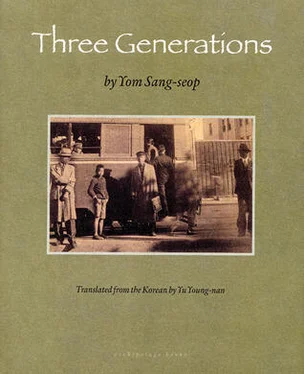When Deok-gi’s grandfather was still alive, Sang-hun had used the deeds of the Hwagae-dong house as collateral and had left a trail of considerable debts. Sang-hun was being bombarded with demands for payment but didn’t have the cash. Deok-gi had just spent two thousand won installing his father’s concubine, and Sang-hun himself had squandered his father’s bank deposit of four or five thousand. He had also used the land deed in his name to secure a loan of a thousand won at a gaming parlor but had lost it all that same night. While he was being pressured for the money, he was approached about taking over a stock trading shop. Sang-hun thought it might be the only way to recover his money, but at that point, as if heaven were on his side, Deok-gi was taken away by the police. Sang-hun thought that with his son in jail, depending on how long it took the police to discover that he was innocent — he could resort to an emergency measure.
On the day he went to the house to see if he could get the key to the safe, his wife had ruined everything when she threw the safe out onto the veranda. If she hadn’t aggravated him, he could have easily opened the small safe himself. But instead he decided to use an old guy who had swindled money in mahjong parlors to pose as a detective. Though this lowlife was eager to be part of the action, he knew nothing about opening safes and recommended a retired office worker he knew, who used to oversee company safes.
While Deok-gi was asking in his feverish delirium whether his father had the will, land deeds were being converted into cash and a contract for the agent’s office was signed. The father’s luck ended with his arrest, while Deok-gi’s turned with it. If Deok-gi were cleared of all misdeeds, suspicion would shift to Sang-hun or the Suwon woman, but Sang-hun hadn’t thought this through. His theft of the documents was not linked to the Jang Hun case or to the poisoning and seemed to be of little importance. The police intended to conclude the matter quickly.
Seated across from Deok-gi, the chief took out a document from his briefcase.
“Whose writing is this?”
It was his grandfather’s will.
Then he took out another one. It was his grandfather’s will with the same date as the first one, instructing that the rice refinery be given to Sang-hun. The handwriting was identical. “What about this one?”
“It’s my grandfather’s.”
“If you make a false statement, you’ll be committing perjury, so be careful what you say. Where was your grandfather’s seal?”
“It was in the safe, but my father asked for it.”
“When?”
Anxious that his words might contradict his father’s, Deok-gi remembered that he’d last used the seal when he gave the Suwon woman the deed for the Taepyeong-dong house. “I think it was last month.” Deok-gi tried to read the chief’s mind.
The detective asked nothing further. He simply told the assistant beside him to fetch Sang-hun.
Deok-gi was afraid of what might ensue. Within five minutes, his father entered the room, followed by a policeman. Deok-gi’s head dropped as if a knife had landed on the nape of his neck.
How can this be? Deok-gi couldn’t lift his bowed head. The police had removed anything that could be used as rope. His father’s Korean jacket was missing its frontal ties, and his ankle ties were nowhere in sight; his trousers, too, must have been without a belt, as they were rolled up high to prevent him from tripping. It was possible they were treating his father more roughly than they were treating him.
The chief looked Sang-hun up and down, a mocking smile on his lips. He waited until Sang-hun sat down before he placed several documents before the father and son. The father sat with his head bowed, while Deok-gi took his time sorting through them.
The papers made up about half of what had been in the safe. What could Deok-gi do if he found that some were missing? He counted them, unsure how many his father had taken with him. Only several small deeds remained.
“One of your mother’s and one of yours are gone. The others are still in the safe,” Deok-gi’s father uttered.
The chief made Deok-gi write a list of the documents that were on the table and asked Sang-hun when he received the will that granted him ownership of the rice refinery.
“Right before my father passed away. Through him.” He thought it would be advantageous to make it sound as if Deok-gi knew about it.
The chief then asked Deok-gi, “Didn’t you say you’d changed the name on the deed last month when you handed over the seal?”
Sang-hun had thought it was fortunate that the chief had questioned him first. Regardless of how angry his son might be, he wouldn’t send his father to prison. Even if Sang-hun told outright lies, his son would not expose him. Knowing had eased his mind. But their stories didn’t match. Sang-hun felt dizzy, thinking there was no way out for him now and that at his age he’d be in grave trouble.
The chief stared at the father and son, red-faced and stupefied before him, and burst out laughing. He was eager to make a laughingstock out of Sang-hun. The chief held a deep antipathy toward Christians, and he had long ago taken a dislike to Sang-hun. The detective couldn’t resist this opportunity to humiliate him.
The chief ordered that the concubine be brought in. Ui-gyeong’s stilettos clicked loudly. She wasn’t handcuffed. Deok-gi hadn’t expected to see her.
The detective separated Ui-gyeong from Sang-hun. Deok-gi didn’t even look at her.
“How much is in there?” the chief asked, pushing a small suitcase toward Deok-gi.
“Two thousand three hundred won,” Ui-gyeong answered, without a trace of hesitation or fear.
Given the small sum, Deok-gi surmised that the land had been used as collateral.
“Didn’t you say you got three thousand five hundred in collateral?”
“Yes, but fifty won was deducted as interest in advance, and we spent some in Pyeongyang.”
The chief took out a ring of keys from the suitcase and tossed it toward Deok-gi. “We’re supposed to keep this here for now, but the safekeeping procedures are complicated. That’s why we’re giving everything back to you.” He asked Deok-gi to sign a receipt and then directed his attention to Ui-gyeong.
“Your man was all the more lovable when he pressed a large wad of cash in your hand, wasn’t he?”
Without any trace of concern, she smiled and said, “I had no objections, but I just kept it temporarily. He didn’t want me to use it all.”
Deok-gi couldn’t bear to listen.
“Did you talk him into doing this?”
“What’s there to talk him into? Did I know whether his wife owned a piece of land or part of the sky? I just went along with him. He told me we’d have fun.”
“Then out of all the deeds why did you make him liquidate his wife’s? You made him do it, didn’t you? You told him to get rid of that one first because it was too small for you to swallow but too big to ignore, right?”
“I had no idea what was going on. He said it was hard to find a lender or a buyer for the big ones.”
The chief laughed at her and said, “As long as you were at it, you should have taken a big one. You missed a good chance. As you see, they’re now going back where they belong.”
“Who wants to go to prison?”
“Do you think you won’t end up there anyway?”
“Why should I? What did I do wrong? Women follow men, I just did what I was told. Is that a crime?”
“Quite correct. Since women follow men, the wife should follow her husband right to prison.”
The word prison startled everyone.
The chief looked at Sang-hun and thundered at him, “How old are you? You’ve got to be at least fifty. Aren’t you well over the ‘age of doubts’? Was your learning useless? Aren’t you ashamed to look your own son in the eye?”
Читать дальше












